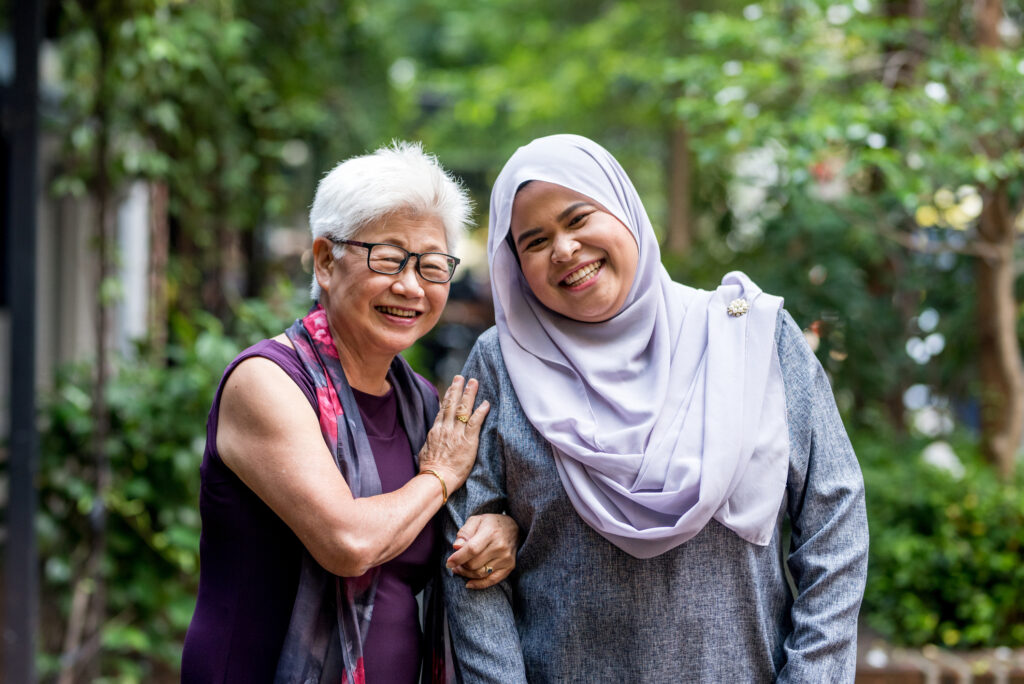State Medicaid home- and community-based waivers and state plan amendments can provide critical information, counseling, and training to family caregivers. Recently, the National Academy for State Health Policy (NASHP) reviewed states’ Medicaid 1915(c) and 1115 waivers, and 1915(i) and 1915(j) state plan amendments (SPAs) that focuses on waivers and state plan amendments covering older adults and adults with physical disabilities, to highlight their unique approaches to training and supporting caregivers.
Family caregivers provide increasingly intense and complex care that requires them to learn how to perform difficult medical and nursing tasks. Training and other supportive services offered through Medicaid waivers and state plan options can be important tools to assist the caregivers of Medicaid enrollees with long-term needs, promote better care, and potentially delay admission to higher levels of care. As many individuals are confined to their homes due to the COVID-19 pandemic, reliance on these services and supports provided by family caregivers is greater than ever.
Findings
Twenty-four states include education, training and counseling for family caregivers in their 1915c and/or 1115 waivers. Fifteen states use their 1915c waivers to provide these services; six states provide services through a 1115 waiver; and three (Minnesota, South Carolina, and Washington State) include services in both 1915c and 1115 waivers. While states often include these services (particularly within 1915c waivers), states varied greatly in identifying which caregivers were eligible for training, education, and/or counseling services and which services were provided. States also varied in their requirements for how the need for these services was documented.
States define informal or unpaid caregivers using a range of familial relationships. Florida, Rhode Island, and Utah define unpaid caregivers in their states’ waivers as “any person, family member, neighbor, friend, companion, or coworker who provides uncompensated care, training, guidance, companionship or support to a person served.” Georgia is the only state to specify that spouses, in particular, currently are not eligible for specific waiver caregiver education and training services. Georgia and Indiana specified in their waiver service definitions that caregivers had to live with care recipients to qualify as caregivers who could receive specific caregiver education and training services.
Several states make distinctions between paid and unpaid caregivers.
- Seven states (FL, CA, MD, OR, RI, UT, WA) provide education and training services for unpaid caregivers. For example, Washington State’s 1115 waiver includes education and training for unpaid caregivers through its Medicaid Alternative Care (MAC) program, and Rhode Island’s 1115 waiver includes unpaid caregiver training and counseling services.
- Four states (HI, PA, WI, MN) specify that both paid and unpaid caregivers may qualify for specific training services. Hawaii’s 1115 waiver and Pennsylvania’s and Wisconsin’s 1915c waivers specify that paid and unpaid caregivers can access specific services. Minnesota’s 1915c waiver specifies that only consumer-directed community supports services can be used to purchase training for paid or unpaid caregivers. Other waiver services are for informal or family caregivers, and its 1115 waiver mirrored the 1915c waiver.
States’ training and education includes a range of topics and modalities. Collectively, states list a range of different types of training related to medical care, including but not limited to education and training on:
- Specified medical equipment;
- Medical treatment;
- Personal care assistance;
- Medications;
- Performance of instrumental/activities of daily living (I/ADLs) or body movements; and
- Disease pathways or specific conditions.
Eight states (MA, MN, NJ, UT, TN, SC, WA, and WI) listed some kind of formalized training related to providing care. Collectively, states listed various types of services, including evidence-based programs, seminars, group training, or reimbursement for conference attendance. For example, Minnesota allows costs of training and conference registration fees to be included in training and education, but does not cover transportation, travel, meals, or lodging. One state, Maryland, explicitly excludes group or classroom training.
Several states also covered caregiver-specific services, such as:
- Financial support for attending caregiver-related training programs;
- Support groups;
- Non-psychiatric counseling services;
- Caregiver coping skills building; and
- Consultation services.
Hawaii, Iowa, Washington, Minnesota, and New Jersey specifically mention counseling or similar services aimed at caregivers. Iowa’s 1915c waiver includes counseling that could address adjusting to a care recipient’s disability or terminal condition. Two states, New Jersey and Washington State in their 1115 waivers, include training on coping skills as a caregiver support. New Jersey offers seminars, including a seminar on coping skills for caregivers of individuals with long-term care needs. Hawaii includes “supportive counseling” and family therapy in its waiver service list.
States require these services to be included in assessments and care plans.
All states with training, education, and/or counseling services for family caregivers include language in waivers that these services must be listed under a care or support plan, evaluation, service plan, therapeutic regimen, or some other type of identification or assessment in order to be reimbursed. Washington State’s 1115 waiver requires caregivers to complete a specified caregiver screening and, as needed, a specified caregiver assessment to determine qualification for specific tiers of services. Tennessee includes caregivers in its face-to-face assessment – assessing caregiver well-being and continued ability to provide care.
Conclusion
States have great flexibility with Medicaid waivers and state plan amendments to provide education, training, and counseling to family caregivers. Several states also incorporate flexibility into the types of training that can be provided to caregivers, often specifying a range of caregiver education, training, and/or counseling opportunities.
Recognizing that states depend on family caregivers to provide critical support to help relatives, friends, and neighbors, especially during the pandemic, NASHP will be publishing state resources on Medicaid policies supporting family caregivers through the RAISE Act Family Caregiver Resource and Dissemination Center with support from The John A. Hartford Foundation and in collaboration with the US Administration for Community Living. NASHP will analyze topics including respite services, reimbursement for caregivers, and paid leave in its future work.
Note: State-only funded programs as well as waivers and amendments for children and people with intellectual/developmental disabilities are not included in this analysis.
Information for Wyoming and Kentucky was not available for this analysis.



